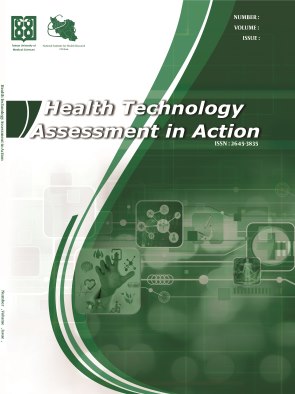The Potentials of Big Data in Achieving Universal Health Coverage in Iran
Abstract
Big data refers to large and complex data sets that cannot be easily processed managed or analyzed using traditional data processing tools and techniques. The role of big data in health encompasses a wide range of applications that leverage large and complex data sets to improve health outcomes and healthcare delivery. With the growth of digital health technologies and the increasing availability of health data from various sources, big data analytics has become a critical tool in healthcare research, management, and decision-making. The goal of UHC is to ensure that everyone has access to the health services they need, when and where they need them, without having to face financial barriers or catastrophic health expenditures that can lead to poverty. UHC plays a critical role in achieving equity in health by ensuring that all individuals and communities have access to quality health services without facing financial hardship. Big data can play a significant role in achieving equity by enabling the identification and analysis of disparities and inequalities across various domains, including healthcare, education, employment, and social welfare. The use of big data in Iran's health system has the potential to significantly improve healthcare delivery, enhance patient outcomes, and reduce healthcare costs. Big data can be used to monitor and evaluate progress towards achieving UHC goals in Iran.
1. Jing Y, Yang J, Johnson DB, Moslehi JJ, Han L. Harnessing big data to characterize immune-related adverse events. Nat Rev Clin Oncol. 2022;19(4):269-80.
2. Brophy JM. Big Data, Big Expectations, and Big Judgements. Can J Cardiol. 2022;38(10):1567-9.
3. The Lancet Digital Health. Big data and long COVID. Lancet Digit Health. 2022;4(7):e477.
4. Piovani D, Bonovas S. Real World-Big Data Analytics in Healthcare. Int J Environ Res Public Health. 2022;19(18):11677.
5. Li X, Olatosi B, Zhang J. Harnessing Big Data to end HIV. AIDS Care. 2022:1-2.
6. Chan CL, Chang CC. Big Data, Decision Models, and Public Health. Int J Environ Res Public Health. 2022;19(14):8543.
7. Sanchez-Pinto LN, Luo Y, Churpek MM. Big Data and Data Science in Critical Care. Chest. 2018;154(5):1239-48.
8. Benke K, Benke G. Artificial Intelligence and Big Data in Public Health. Int J Environ Res Public Health. 2018;15(12):2796.
9. Mooney SJ, Pejaver V. Big Data in Public Health: Terminology, Machine Learning, and Privacy. Annu Rev Public Health. 2018;39:95-112.
10. Beam AL, Kohane IS. Big Data and Machine Learning in Health Care. JAMA. 2018 319(13):1317-8.
11. Lau E, Wu JC. Omics, Big Data, and Precision Medicine in Cardiovascular Sciences. Circ Res. 2018 122(9):1165-8.
12. Garrison LP Jr. Universal health coverage--big thinking versus big data. Value Health. 2013;16(1 Suppl):S1-3.
13. Tao W, Zeng Z, Dang H, Li P, Chuong L, Yue D, et al. Towards universal health coverage: achievements and challenges of 10 years of healthcare reform in China. BMJ Glob Health. 2020;5(3):e002087.
14. Squires N, Colville SE, Chalkidou K, Ebrahim S. Medical training for universal health coverage: a review of Cuba-South Africa collaboration. Hum Resour Health. 2020;18(1):12.
15. Tangcharoensathien V, Mills A, Patcharanarumol W, Witthayapipopsakul W. Universal health coverage: time to deliver on political promises. Bull World Health Organ. 2020;98(2):78-A.
16. Fisher M, Freeman T, Mackean T, Friel S, Baum F. Universal Health Coverage for Non-communicable Diseases and Health Equity: Lessons From Australian Primary Healthcare. Int J Health Policy Manag. 2022;11(5):690-700.
17. Taniguchi H, Rahman MM, Swe KT, Islam MR, Rahman MS, Parsell N, et al. Equity and determinants in universal health coverage indicators in Iraq, 2000-2030: a national and subnational study. Int J Equity Health. 2021;20(1):196.
18. Wang TT, Mathur MR, Schmidt H. Universal health coverage, oral health, equity and personal responsibility. Bull World Health Organ. 2020;98(10):719-21.
19. Rodney AM, Hill PS. Achieving equity within universal health coverage: a narrative review of progress and resources for measuring success. Int J Equity Health. 2014;13:72.
20. Noorbakhsh-Sabet N, Zand R, Zhang Y, Abedi V. Artificial Intelligence Transforms the Future of Health Care. Am J Med. 2019;132(7):795-801.
21. Kulkarni S, Jha S. Artificial Intelligence, Radiology, and Tuberculosis: A Review. Acad Radiol. 2020;27(1):71-5.
22. Pillay TS. Artificial intelligence in pathology and laboratory medicine. J Clin Pathol. 2021;74(7):407-8.
23. Yoldemir T. Artificial intelligence and women's health. Climacteric. 2020;23(1):1-2.
24. Giansanti D. Artificial Intelligence in Public Health: Current Trends and Future Possibilities. Int J Environ Res Public Health. 2022;19(19):11907.
25. Ray A, Bhardwaj A, Malik YK, Singh S, Gupta R. Artificial intelligence and Psychiatry: An overview. Asian J Psychiatr. 2022;70:103021.
26. Martinez-Millana A, Saez-Saez A, Tornero-Costa R, Azzopardi-Muscat N, Traver V, Novillo-Ortiz D. Artificial intelligence and its impact on the domains of universal health coverage, health emergencies and health promotion: An overview of systematic reviews. Int J Med Inform. 2022;166:104855.
27. Alami H, Rivard L, Lehoux P, Hoffman SJ, Cadeddu SBM, Savoldelli M, et al. Artificial intelligence in health care: laying the Foundation for Responsible, sustainable, and inclusive innovation in low- and middle-income countries. Global Health. 2020;16(1):52.
28. Das T, Takkar B, Sivaprasad S, Thanksphon T, Taylor H, Wiedemann P, et al. Recently updated global diabetic retinopathy screening guidelines: commonalities, differences, and future possibilities. Eye (Lond). 2021;35(10):2685-98.
29. Kipruto H, Muneene D, Droti B, Jepchumba V, Okeibunor CJ, Nabyonga-Orem J, et al. Use of Digital Health Interventions in Sub-Saharan Africa for Health Systems Strengthening Over the Last 10 Years: A Scoping Review Protocol. Front Digit Health. 2022;4:874251.
30. Li S, Hickey GW, Lander MM, Kanwar MK. Artificial Intelligence and Mechanical Circulatory Support. Heart Fail Clin. 2022;18(2):301-9.
| Files | ||
| Issue | Vol 6, No 4 (2022) | |
| Section | Brief Report | |
| DOI | https://doi.org/10.18502/htaa.v6i4.12823 | |
| Keywords | ||
| Big data equity universal health coverage Iran health policy | ||
| Rights and permissions | |

|
This work is licensed under a Creative Commons Attribution-NonCommercial 4.0 International License. |




